|
|
Blog Archives:
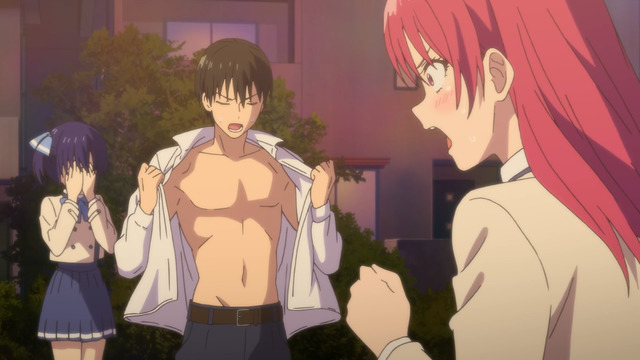
It's a pragmatic solution. Don't just dismiss it out of hand.
Not having a whole lot else to watch from the Summer 2021 anime season, I decided to give Kanojo mo Kanojo (Girlfriend, Girlfriend) a try on a goof. It turns out it's sort of fantastic. I initially assumed it was going to another one of those dreary harem comedies with a loathsome male protagonist surrounded by multiple girls who are entirely out of his league and yet inexplicably attracted to him. Or that it was going to be on of those dreary harem comedies where Potato-kun is actually sort of an all right dude, but is inexplicably incapable of noticing that every girl he comes into contact with keeps throwing her panties at him. It turns out Kanojo mo Kanojo is neither of those things. Rather, it's got some manner of Möbius strip horseshoe theory thing going on where all the environmental factors and character decisions that should be working to the show's detriment end up making it better.
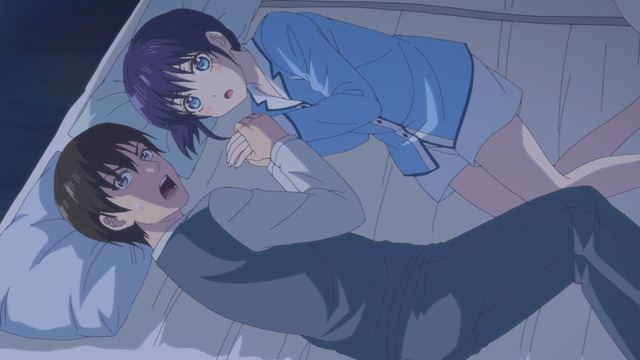
Busted.
It's no accident Kanojo mo Kanojo is working out this way. The recurring focus of the show's various dilemmas is on an unending series of incorruptibly honest decisions to pursue uncompromising choices that should result in self-destructive consequences by any reasonable objective standard. And yet it all continues to work out. I can't vouch for the manga source material, but the anime embraces the absurdity of its premise and absolutely succeeds in its execution.
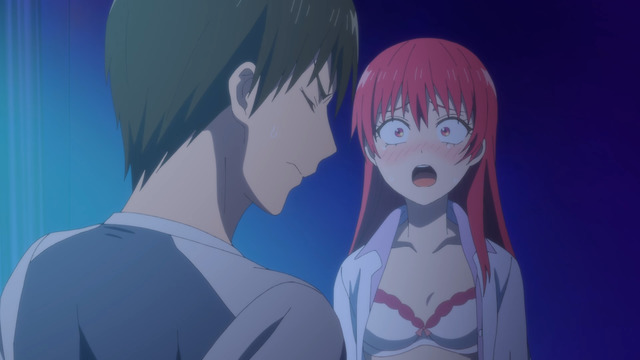
Never gonna happen.
Significantly, there is no hint of melodrama. That is something Girlfriend, Girlfriend really cannot afford. If Kanojo mo Kanojo ever decides to examine the consequences and societal frictions associated with polyamorous relationships, or attempts to position the various love interests against each other from hostile postures of envy or jealousy, it will do so at its peril. There had also better not be any of that typical harem comedy bullshit where a series gets its viewers to root for one of the girls to "win." (If it does, the erstwhile winner will probably be First Girl Childhood Friend, even though she has nothing in her favor compared to her rivals except for her hair.)
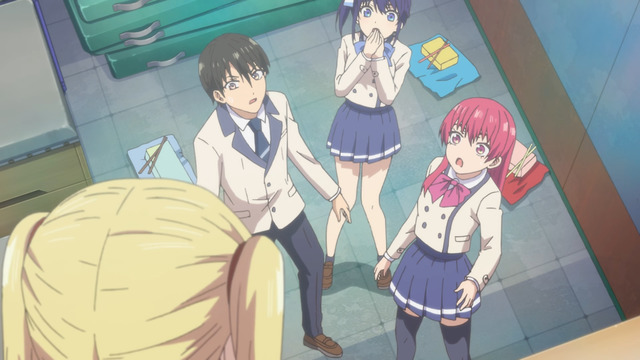
Busted.
Even though I only started watching Girlfriend, Girlfriend a short while ago, it did not take long before I caught up. There are currently 10 episodes out so far and only two to go. Since the source manga still seems to be running (I think eight volumes are out), a non-ending ending to the anime is probably basically guaranteed. I don't know how far Kanojo mo Kanojo can take its premise without getting derailed, but I would be in favor of additional seasons if it can keep up the show's high-intensity, relentless pace episode after episode without running out of steam.
Posted in GIRL NEXT DOOR, Kanojo mo Kanojo | Tags: Bend Her Over a Kotatsu, Built for Sin, Childhood Friend, Comedy, Fan Service, Hair, Harem Comedy, Initial impressions, Love Triangle, Manga, Plying Girls, Romance, Season Introduction, tsundere, Unrequited Love | Permanent Link
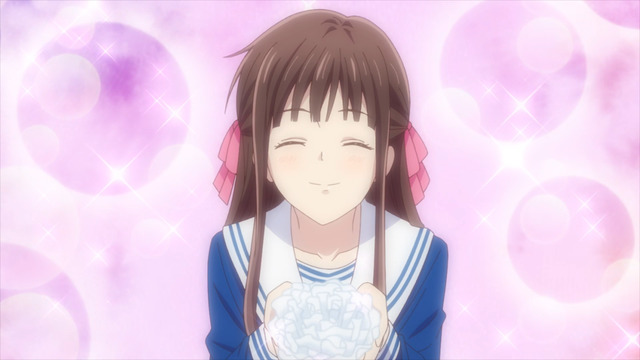
This is how everyone sees Honda Tohru and yet people
still manage to be assholes to her.
It's sort of difficult to talk about Fruits Basket: The Final because it's a 13-episode conclusion in a 63-episode adaptation of a well-regarded 23-volume manga. It's also a do-over succeeding a 26-episode series from 20 years ago which was also really good even though the source material hadn't ended yet. So, there's a lot going on.
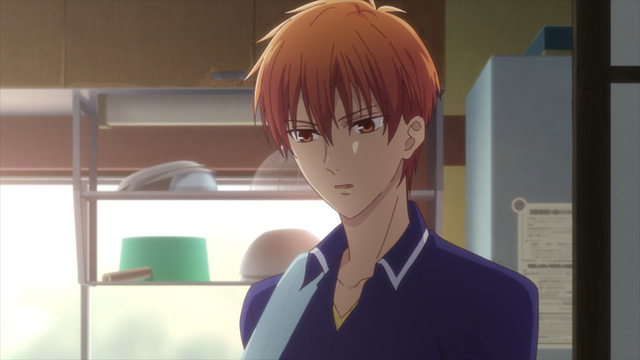
Is cat.
I do wish I had paid closer attention when I started watching this iteration of Fruits Basket when it began in 2019. There are a lot of characters, and there is a lot of setup, and I'm certain I missed a lot of subtleties early on. I suppose that is an argument in favor of re-watching the series, even if it is 63 episodes long, but that isn't going to happen until I've finally gotten around to reading the source material. It's gonna be a while.
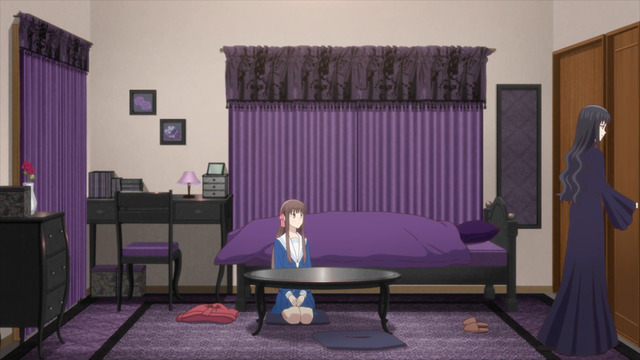
This bedroom is fantastic.
Probably everyone who has heard about Fruits Basket also knows opinions about it are almost universally favorable. Likewise, anyone thinking about getting into the series probably knows at least as much as I did concerning what it's ostensibly "about" before I watched the first anime (the 2001 one with Hocchan). One thing that surprised me as I got deeper into the plot is how monstrous the zodiac aspects are regarded in-universe. They're not set up that way at the start of the series at all.
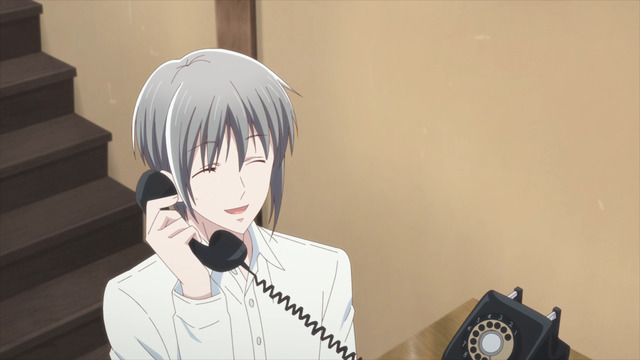
Look, a rotary phone.
I don't really want to write about Fruits Basket, since it's basically one of those shows where you can just sort of say, "Look, everyone says it's good. It is good. Just watch it." I can also see how it might not be for everyone. You have to have to have an appetite for romance and a tolerance for assholes. So many assholes. Honda Tohru is, like, the nicest, sweetest, goodest girl in the entire world and she's constantly surrounded by bitches being bitches and assholes being assholes. Back the fuck away from Honda Tohru, people.
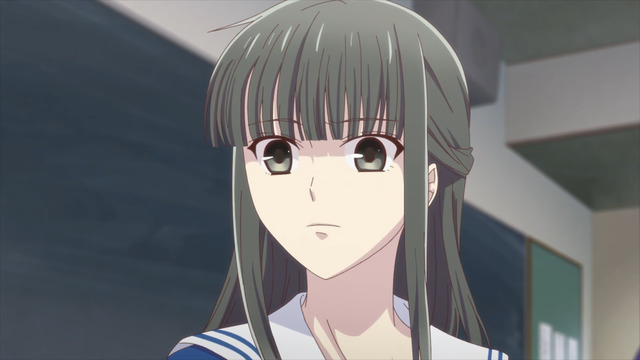
People are also assholes to Machi.
I guess viewers also have to be okay with "problematic" 'ships. I don't know if this heightened anxiety is an actual sign of the times, or if it's just localized sensitivity found on the Twitter. There are multiple age-gap pairings. There are people being mean to the people they love. Honda Tohru's mom dies. It's a whole thing. I guess the Fruits Basket 'ships are less "problematic" than the ones in Card Captor Sakura, but if these are the sorts of things that genuinely bother you, shoujo might not be for you.
Posted in Fruits Basket, RECOMMENDATIONS | Tags: 16-year-old love interests, Bedrooms, CATS, Crying, Ensemble Cast, Kugimiya Rie, Love Confessions, Love Triangle, May-December Romances, Plying Girls, Romance, Season Conclusion, Season Introduction, Sex, Shoujo, Spoilers, Spring 2019, Spring 2020, Spring 2021, Summer 2019, Summer 2020, tsundere, Twitter, Unrequited Love, Yui Horie | Permanent Link
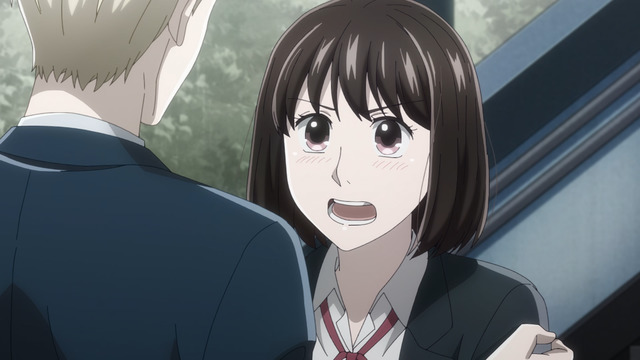
They're not flirting.
I started the Spring 2021 season with an entry covering both Koi to Yobu ni wa Kimochi Warui (It's Disgusting to Call This Love or KoiKimo) and Hige wo Soru. Soshite Joshikousei wo Hirou. (I Shaved. Then I Brought a High School Girl Home. or HigeHiro), so I guess I should have a post wrapping them up as well. I found KoiKimo to be a better series, perhaps because of its straightforward story. It also helps that KoiKimo leaves Ichika in control of her fate. It is ultimately Ichika's decision whether her relationship with Ryo will advance or not.
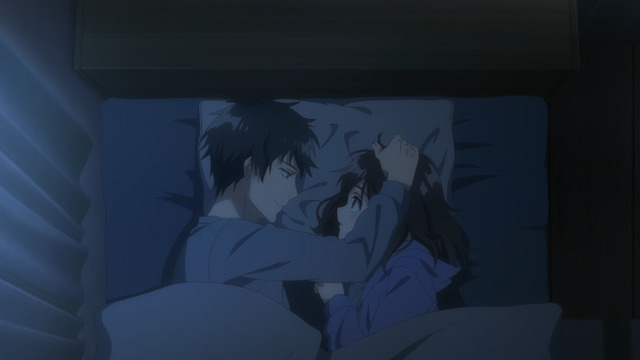
Platonic head pat.
Sayu does not have this luxury in HigeHiro. Maybe it's disingenuous to claim HigeHiro is about Yoshida "looking for something attractive to save" (my apologies to Liz Phair), but replace Yoshida's name here with "the audience's surrogate," and maybe it's not far off the mark. KoiKimo and HigeHiro both ended up where I expected, but Sayu had much less say over the path she took to get there.
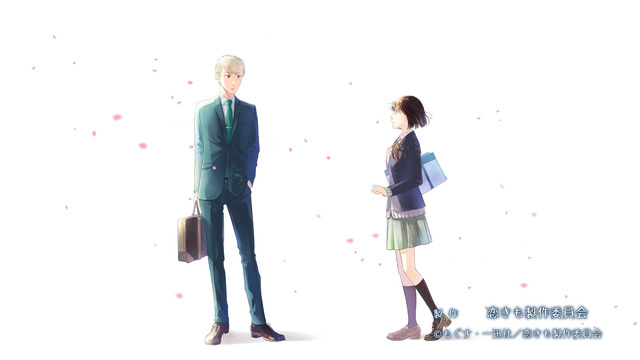
Making the end credits look more like the manga art was a nice touch.
In contrast, KoiKimo is an honest romance. There is no real mystery whether Ichika and Ryo will actually end up together or not, even though KoiKimo does introduce rival love interests for both leads. Moreover, the rivals are genuinely more sensible partners from every objective metric. However, the most obvioius impediment—the age gap between Ichika and Ryo—is never depicted as a meaningful obstacle. When it is finally viewed as a problem, its solution is entirely unsurprising.
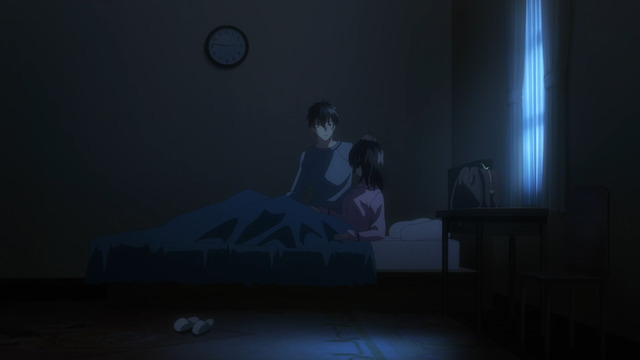
Platonic head pat.
The solutions to the challenges presented in HigeHiro are also fairly obvious, but the series insists on pantomiming a number of unconvincing feints. They're unconvincing because Sayu basically has no flaws, and Yoshida clearly feels something for her. He never has a reason to turn her away, and Sayu's rivals for Yoshida's attention are dubious love interests who quickly end up supporting Sayu anyway.
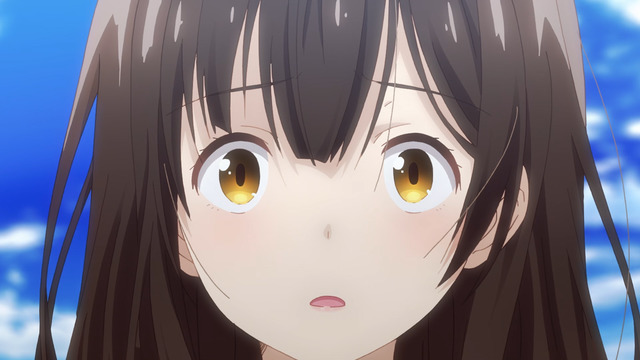
Relax, Sayu. Wonder Eggs are only 500 yen each.
In fact, Sayu's true adversaries are her lack of self-worth, her family's disinterest in her welfare, and the story's insistence at making Yoshida obtuse. Yoshida's behavior is baffling in HigeHiro, and not just because he denies being attracted to the sexually available high school girl living with him. Yoshida's behavior is baffling because he's willing to accept immediately on faith that Sayu would be better off returning to her home, without ever examining even the slightest bit the reasons why she ran away in the first place. It seems irresponsible to not at least contemplate the myriad awful situations that potentially compel teenagers to leave home and offer sex to strangers just to survive.
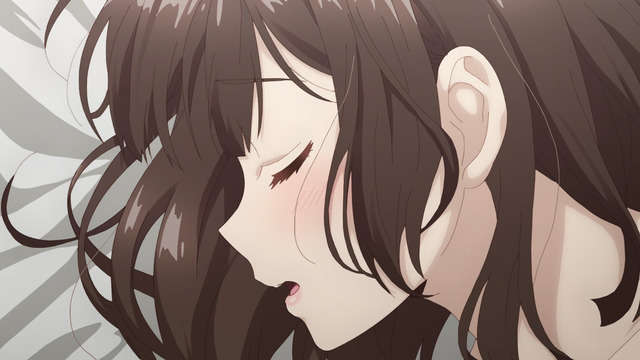
HigeHiro showed Sayu orgasming on screen.
Of course, the real reason Yoshida never asks is because the story can't let him or the audience know before the narrative is ready. It turns out the unpleasant situation Sayu fled wasn't that bad, but that's the case only because HigeHiro insists on rehabilitating its antagonists immedately after introducing them. This sort of cowardice is a significant weakness of HigeHiro, as it makes its conflicts fairly hollow. The challenges presented in KoiKimo are not intractable either, but at least they don't take on a fraudulent quality.
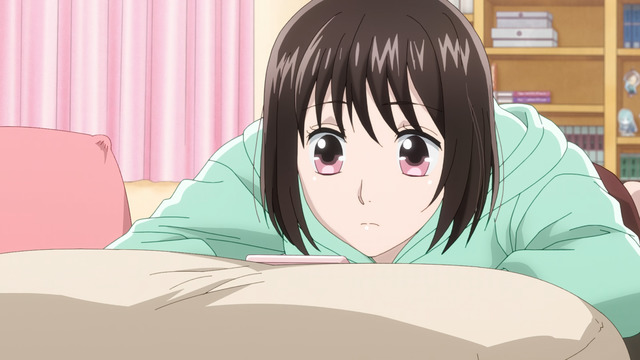
Ichika grew accustomed Ryo's nightly calls without realizing it.
KoiKimo succeeded by being forthright about its romance and committing to it unapologetically. In contrast, HigeHiro (like Yoshida himself) spends basically the entire series maintaining an unconvincing veneer of plausible deniability over whether or not Sayu is an actual love interest. At the risk of attracting accusations of being in favor of age-inappropriate pairings, I'm going to suggest HigeHiro does this to its detriment.
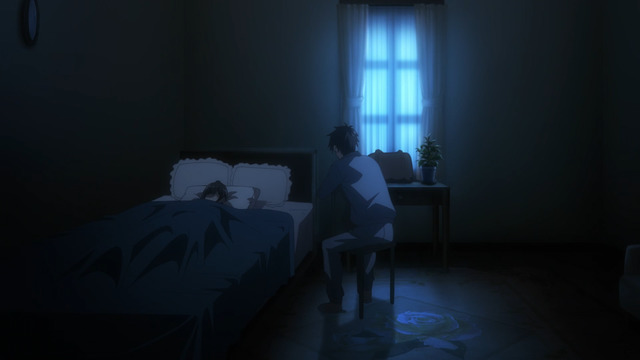
They had to put him in a chair watching her sleep
so people wouldn't insist they still fucked.
I suppose I can't speak for its source material, but the anime most certainly portrays Sayu as an eligible partner. Does HigeHiro provide Sayu with agency by having her test Yoshida's resolve each time she propositions him? Or does the series undermine Sayu's agency by presenting these moments solely so Yoshida can continue to rebuff her and showcase his unflagging integrity? I'm not answering this rhetorical, but I think we all know.
Posted in Hige wo Soru. Soshite Joshikousei wo Hirou., Koi to Yobu ni wa Kimochi Warui | Tags: 16-year-old love interests, Bad Things Happen to Good People, Bend Her Over a Kotatsu, Built for Sin, Christmas Cake, Compare and Contrast, Fan Service, Hanakana Distortion Field, Hanazawa Kana, Harem Comedy, Light Novels, Love Confessions, Love Triangle, Manga, May-December Romances, Plying Girls, Rape, Romance, Season Conclusion, Sex, Spoilers, Spring 2021, tsundere, Unrequited Love | Permanent Link
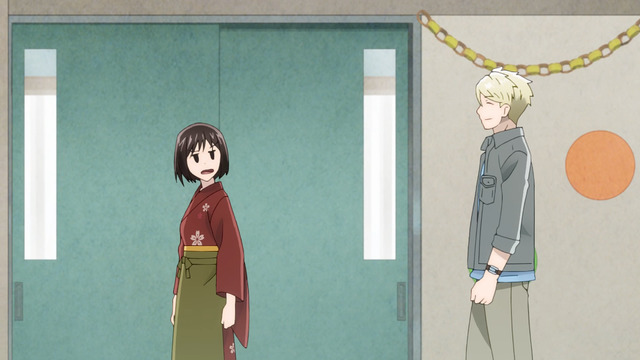
Stalker distancing.
News that the Spring 2021 anime season would feature TWO shows about adult men paired with high school girls created ripples across the Twitter, but even this mild outrage waned after viewers discovered neither show was as torrid as anticipated. Descriptions of Koi to Yobu ni wa Kimochi Warui (It's Disgusting to Call This Love, A.K.A. Koikimo) in particular concentrated on elements that ranged from misleading (characterizing its male lead as "a womanizer") to outright untruthful (e.g., calling him "sex-crazed...with a wandering eye for women"). At the risk of stereotyping too much, I suspect more attention should have been paid to the fact that the Koikimo manga is described as josei (i.e., for adult women) instead of seinen (i.e., for adult men who miss fucking teenage girls).
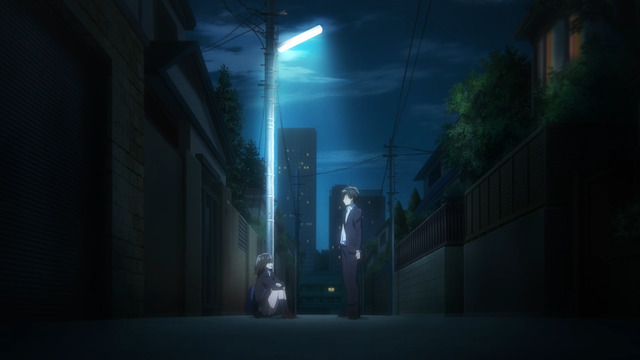
I was too bothered by Sayu's lack of luggage to make a Fate/stay night joke.
Curiously, Hige wo Soru. Soshite Joshikousei wo Hirou. (Higehiro: After Being Rejected, I Shaved and Took in a High School Runaway) seemed to attract less pre-season attention than Koikimo, but perhaps its original novels and manga adaption were already known well enough to deflect unwarranted speculation that it was going to be a smutty romp. This, despite its synopsis outright stating that its characters meet when the titular teenage girl, Sayu, offers sex in exchange for a place to stay. Instead, Higehiro is about a man, Yoshida, who insists he is not attracted to the JK crashing at his place. The series begins with Yoshida being rejected by his long-term crush (his boss at work, no less) who claims she is already seeing someone. He is so devastated that he seemingly does not even notice she was CLEARLY LYING.
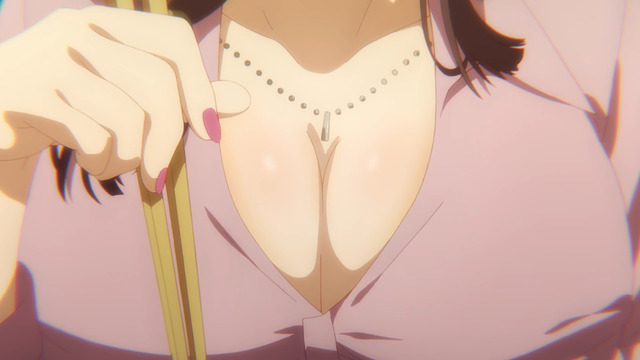
Dude, you're staring.
Higehiro also draws attention to Yoshida's insistence that he is not a "nice guy" for letting Sayu live with him without strings attached (unlike everyone else she has stayed with during her previous six months as a runaway), but rather that the other men she has known are despicable people. Yoshida also repeatedly insists he is not attracted to Sayu because he only likes women with large breasts, but then the show promptly undercuts him by immediately alerting (and repeatedly reminding) the viewer that Sayu's boobs are also comfortably big.
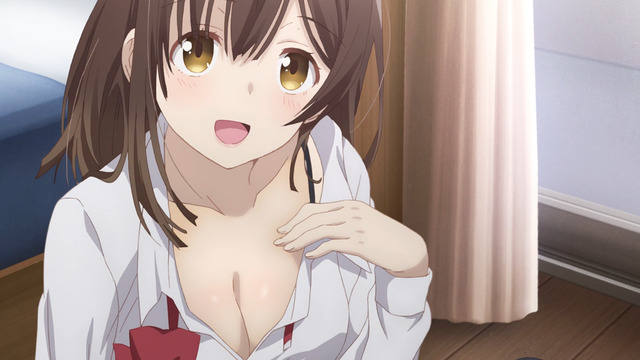
Higehiro even quantifies the comparison.
This is where I lose the ability to predict the path Higehiro will take. There is enough fan service and "male gaze" to the anime that we are obviously supposed to see Sayu as a legitimate love interest of Yoshida's, despite (or perhaps because of) his loud denials. But the show also retains the harem elements by keeping the CLEARLY LYING boss lady and deliberately slapdash co-worker near as potential romantic rivals. If I had to guess how this story ends, I would expect Yoshida's support to put Sayu on a path to success before re-uniting the two after a multi-year timeskip apart that has given Sayu time to become a self-sufficient adult with even bigger boobs than ever. Alternatively, we'll get a cop-out non-ending ending, potentially with all four of them living together for contrived reasons.
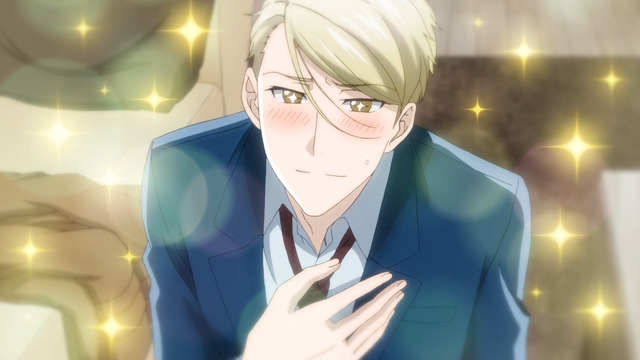
You can tell he's sincere because of the sparkles.
While Higehiro is about a man who denies being attracted to the teenage girl living with him, Koikimo is about a man openly and aggressively wooing a high school girl 10 years his junior. At this point, I think it is necessary to acknowledge the tropes that govern this story's boundaries. Ryo and Ichika meet by chance and a suspension bridge moment sparks his sudden obsession with Ichika, who is coincidentally classmates with Ryo's kid sister, Rio. Fortunately for Ryo, his sister not only approves of his infatuation with her friend, but even volunteers as his wingman to provide opportunities for him to get closer with Ichika.
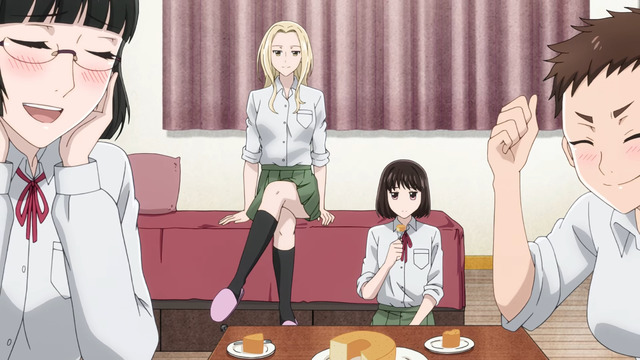
Rio's anime bed is made of concrete.
Moreover, Ichika's own mother approves of Ryo's courtship, despite Ichika's clear displeasure. It is probably worth pointing out that Ryo has apparently never had to pursue a love interest before. He is not a pick-up artist chasing after fresh prey. Instead, girls and women have thrown themselves at him his entire life (Ichika's and Rio's classmates all unanimously agree Ryo is exceptionally handsome), so this is an entirely new experience for him.
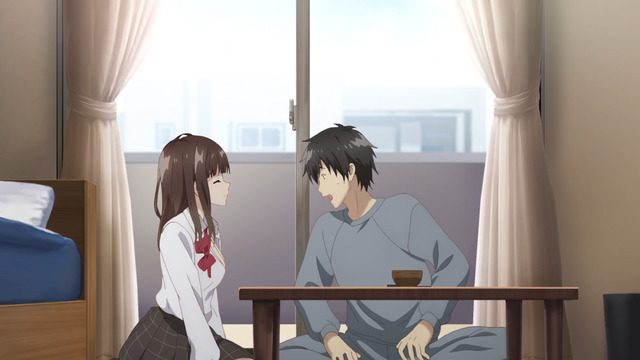
Dude, you're staring.
So what are Koikimo and Higehiro both missing? Lust. In the case of Koikimo, Ryo is clearly, genuinely smitten with Ichika, but he is arguably more drawn to her disinterest in him than he is to her physical appearance. Ichika is presented as being fairly unremarkable among her peers, and her own best friend describes her as "normal" (although at least one boy at her school has taken a liking to her). In the case of Higehiro, it takes three episodes of the show loudly signalling that Sayu is comely and sexually available before Yoshida finally admit he finds her attractive. However, his refusal to sleep with her is predicated on a critical, foundational cornerstone to the narrative's integrity, so I don't expect the story can too easily reverse this stance even if the audience comes to think he protests too much.
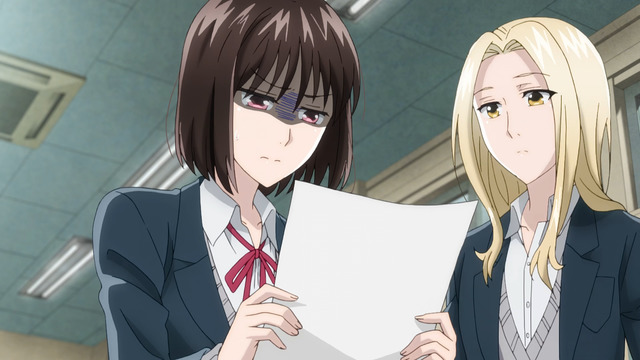
She is upset because she is pleased.
After four episodes of Koi to Yobu ni wa Kimochi Warui and three episodes of Hige wo Soru. Soshite Joshikousei wo Hirou., I enjoy Koikimo more than Higehiro. Neither series is especially realistic (although I could believe Higehiro, despite the melodrama, were it not for the CLEARLY LYING Christmas-cake boss lady and the co-worker who deliberately fucks up her work for Yoshida's attention), but I find Koikimo more amusing. I can't rule out the possibility that I'm simply more enamored of Ichika's seemingly endless barrage of disgusted faces than I am with Sayu's "pretty big for a high school girl" bosom, though.
Posted in Hige wo Soru. Soshite Joshikousei wo Hirou., Koi to Yobu ni wa Kimochi Warui | Tags: 16-year-old love interests, Bend Her Over a Kotatsu, Built for Sin, Christmas Cake, Compare and Contrast, Harem Comedy, Light Novels, Love Confessions, Love Triangle, Manga, May-December Romances, Plying Girls, Rape, Romance, Season Introduction, Sex, Spring 2021, tsundere, Twitter, Unrequited Love | Permanent Link
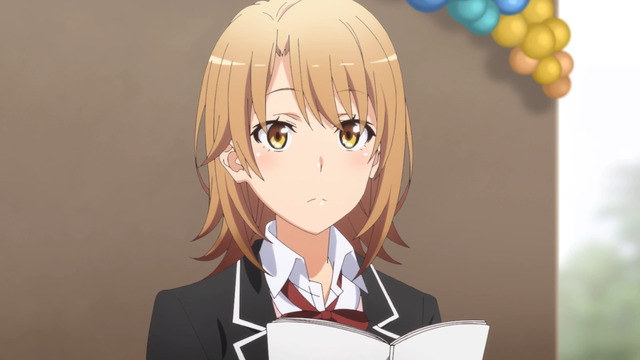
BEST GIRL.
Yahari Ore no Seishun Love Comedy wa Machigatteiru. Kan (My Teen Romantic Comedy SNAFU Climax!, among other localized names) completed the three-season run of a harem comedy that fared surprisingly well despite my initial misgivings. Generally speaking, the term "harem comedy" itself feels anachronistic now and less appropriate even when applied to shows such as Gotoubun no Hanayome (The Quintessential Quintuplets) compared to the label's Love Hina-era association (at least in my mind). I suppose it's probably still applicable for shows such as Kanojo, Okarishimasu (Rent-a-Girlfriend). But I digress.
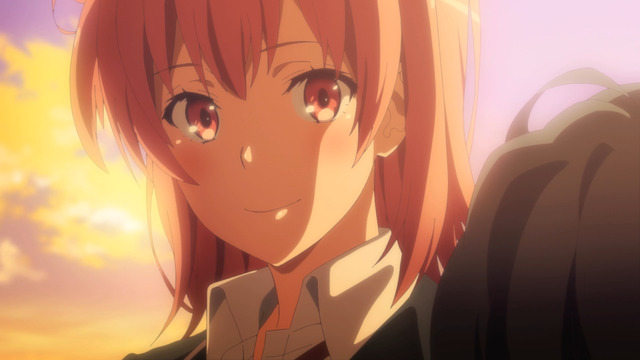
Oregairu might have been a better series if told from Yui's point of view.
These types of shows invoke a competitive element that pits various female protagonists against each other to vie for the male lead's affection, ultimately "winning" by becoming the romantic interest he selects at the conclusion of the series. Longtime readers of this blog may remember I'm not a fan of this construct when the male lead is so frequently a dull sap, to say nothing of the ones who are legitimately terrible cretins. I'm did not watch Kanojo, Okarishimasu, but I did watch it get shredded on the Twitter, and Potato-kun appears to be a colossal douche in addition to the show's numerous other problems. Does the girl who ultimately ends up with such a character really win? [Spoilers: No.]
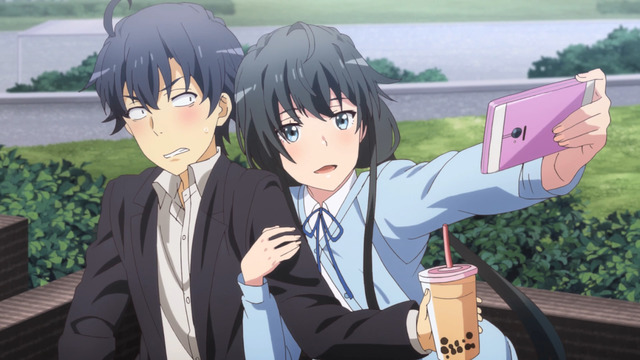
Kids and their selfies.
Oregairu does not suffer from this particular problem, at least by its conclusion. Hachiman in the third season is no longer the same person he was in the first season. Unfortunately, the girl who ultimately "wins" has her own issues. [Spoilers henceforth, obviously, if you haven't already either seen this coming or learned about it via some other way, such as discussions about the light novels' ending.]
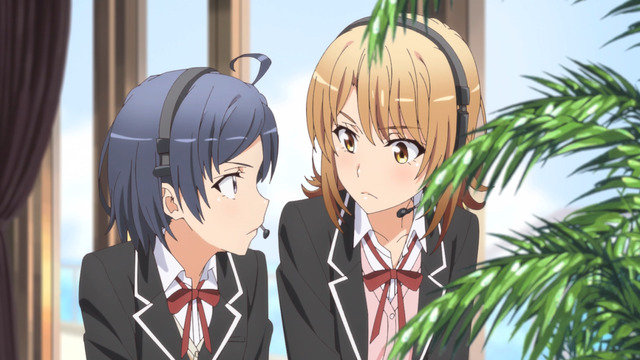
It's about the future, Madam Chancellor.
Yukino is not interesting. She is supposed to be the most complex of the various love interests, and has some significant hang-ups that admittedly align well with Hachiman's character, but I never found her problems or growth compelling. As far as "winning" the harem comedy contest goes, she is the most sensible one to pair with Hachiman, but my lack of investment in their relationship makes the show's resolution somewhat hollow. Ultimately, it was still a good journey, and I can appreciate why Oregairu accumulated so much praise during its run, but I can't quite point to it as a much-watch show by any means.
Posted in BEST GIRL, Yahari Ore no Seishun Love Come wa Machigatteiru, Yahari Ore no Seishun Love Comedy wa Machigatteiru. Kan | Tags: Crying, Douche Bags, First Girl He Sees Clause, Harem Comedy, Light Novels, Love Confessions, Love Hina, Love Triangle, Romance, Season Conclusion, Sequels, Spoilers, Summer 2020, tsundere, Unrequited Love | Permanent Link
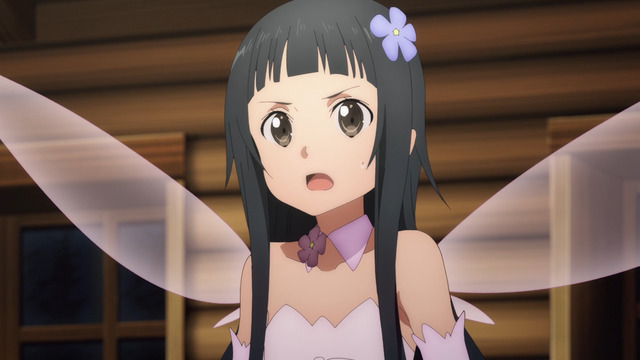
Go on, Yui, curse the bitches out.
Sword Art Online: Alicization - War of Underworld has a mind of its own. Or at least, Sword Art Online: Alicization - War of Underworld is about AIs having minds of their own. Specifically, Alice Synthesis Thirty MacGuffin is the prize AI the bad men are trying to seize because she is a real girl. Never mind that Sword Art Online has had a Real Girl AI almost from the start in the form of Yui, Kirito's and Asuna's adopted daughter. Yui isn't even a secret!
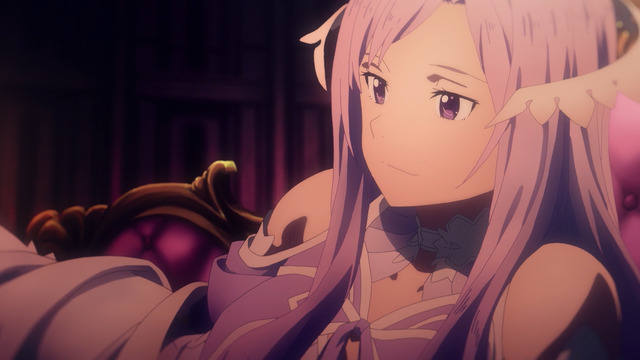
It's not easy being pope.
For that matter, I'm not sure there's any meaningful distinction between the Underworld AI yahoos and the "real world" regular-ass people. I certainly regard Alice as being every bit as much as a real character as I do, say, Asuna, even though Alice is very yellow. I definitely regarded the pope as being more of a real person than nearly every other Sword Art Online villain (including the current ones). Ultimately, this has a lot less to do with Alice and the pope being AIs than it does with Sword Art Online having lots of terribly written characters—especially when it comes to its villains.
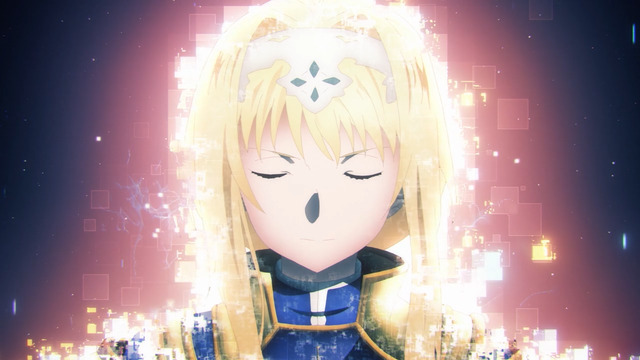
This reminds me I need to get a new video card.
I'm inclined to believe Sword Art Online: Alicization - War of Underworld theoretically could actually have something intelligent to say about artificial intelligence and what makes someone a real person, but any chance it had got undermined by the really awful writing that has plagued the franchise from the beginning. I still find it entertaining, even though Alice is very yellow, but I do wish the franchise would move past its more egregious tropes. The Ordinal Scale movie accomplished this with some success, but it seems to be the exception, not the norm.
Posted in Sword Art Online: Alicization - War of Underworld | Tags: Autumn 2019, Big Fat Braids, Built for War, Characters in Need of Better Shows, Childhood Friend, Hair, Harem Comedy, Haruka Tomatsu, Kanae Ito, Kayano Ai, Light Novels, Love Triangle, Miyuki Sawashiro, Sequels, Superlovely Character Designs, tsundere, Unrequited Love, war, War Is All Hell, Wheelchairs | Permanent Link
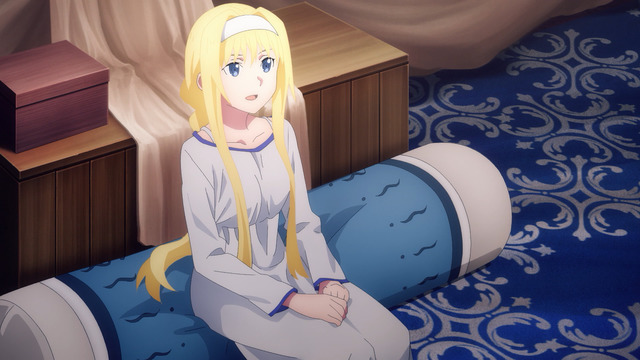
This break in the battle has lasted so long that Alice changed into her pajamas.
It's not particularly sensible to demand accurate war-type stuff in an anime, especially something like Sword Art Online, but they did put War in the title, and they have been building up to this particular conflict for some time. What we've gotten instead is tens of thousands of random schmucks directly facing each other in a narrow canyon making no effort to do anything other than having head-to-head fights. Some people might claim that the battles at least look pretty cool, but that's a concession I'm not willing to make this season, what with Fate/Grand Order: Zettai Majuu Sensen Babylonia raising the bar to ridiculous new levels every week now.
<Divine> Maybe that's just what happens when two sides who don't know what war is given it a try
That's basically it. Now, I'm not unreasonable enough to demand "actually realistic" war in my SAO ~ War Is All Hell ~ anime, but I would have given it a pass without commenting on it had it at least aspired to, say, Strike Witches: War on Underpants levels of realism.
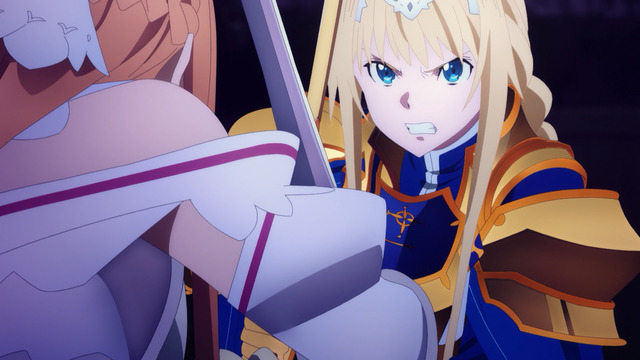
This show is called Alicization, not Asunization, toots.
Now that I've got this bitching out of the way, I guess I can get around to the main point of this post: Spoiling the most recent episode of Sword Art Online: Alicization - War of Underworld. So, Asuna finally logs into the AI world and is immediately beset upon by an extremely yellow blur. Everyone eventually calms the fuck down, though. They even listen to the batshit crazy things Asuna tells them. Frankly, I'm impressed they don't even seem irked that she's referring to her own world as the "real world." Yeah, these AIs are living in a computer, but it probably feels pretty real to them. I would be at least a little insulted. On the plus side, at least she isn't being racist about it.
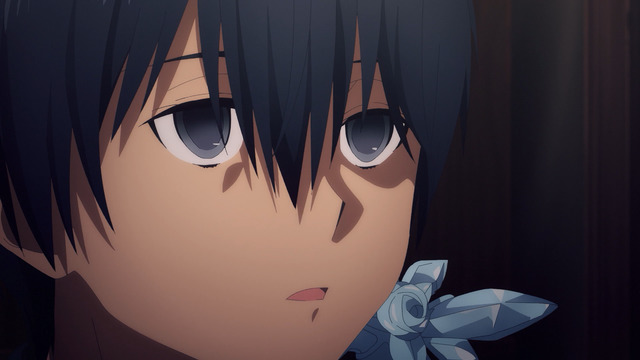
Have you tried rebooting the Kirito in the "real world"?
I'm generally pro-Asuna, even though she hasn't fared particularly well as an actual character in Sword Art Online as a franchise. It was also not encouraging to see all the latest members of Kirito's ever-expanding harem butt in for additional deban and to boast about how great their times with him have been. Hopefully, they're getting all of this out of the way now, and maybe the show can go back to leaving him in a wagon somewhere while Alice is off doing very yellow very important things. I'm okay with Asuna coming along too, providing she doesn't spend all her time talking about Kirito.
Posted in Sword Art Online: Alicization - War of Underworld | Tags: Air Power, Autumn 2019, AYAKO DOCTRINE, Big Fat Braids, Built for War, Characters in Need of Better Shows, Childhood Friend, Hair, Harem Comedy, Kayano Ai, Light Novels, Love Triangle, OP ED, Spoilers, Superlovely Character Designs, tsundere, Unrequited Love, war, War Is All Hell, Wheelchairs | Permanent Link
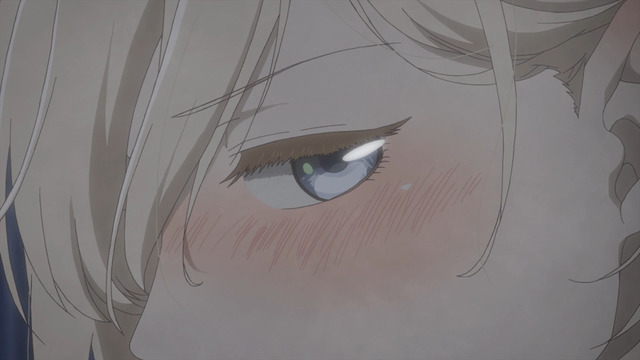
Lewd.
I suppose I need to set aside my anti-Okada bias now that I've enjoyed one of her melodramas so much. As far as sex disasters go, Araburu Kisetsu no Otomedomo yo。 was honestly a little light on the sex and not as traumatic in the disaster department as I would have liked, but O Maidens in Your Savage Season did have the courage to do a lot of things that I don't think an Okada-free show would have attempted. Framed in the sense that tragedies end in murder while comedies end in marriage. I was optimistically hoping Araoto would turn out to be a tragedy, but I still liked it quite a bit even though it turned out to be a comedy.
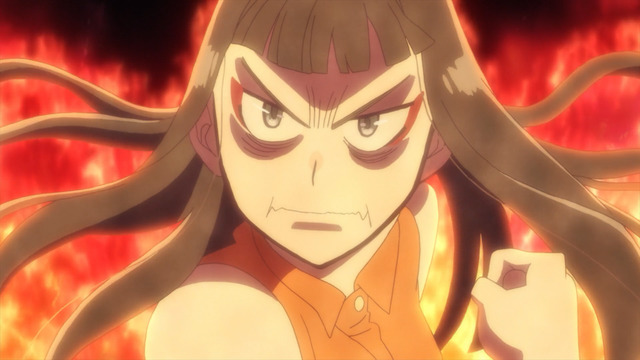
Relax, it's only lust.
Not that there wasn't tragic stuff in it, but we're talking emotional-trauma tragic, not murder-suicide tragic. I do wish Araburu Kisetsu no Otomedomo yo。 had not gone quite so easy on the arcs that had the best opportunities for going really poorly for everyone involved, but I acknowledge this is a sadistic perspective. Besides, fully exploring some of the paths that its characters could have taken would have changed the tone of the show dramatically. Probably I still would have been entertained, but I appreciate that many viewers would not have been as accepting. Still, I don't think it's entirely unreasonable to hope an Okada Mari sex disaster would end with a murder instead of a marriage. I'm just sayin'.
Posted in Araburu Kisetsu no Otomedomo yo。 | Tags: Bend Her Over a Kotatsu, Fat Anime Characters, Love Confessions, Love Triangle, Manga, Plying Girls, Romance, Season Conclusion, Sex, Summer 2019, tsundere, Unrequited Love | Permanent Link
|
|







































